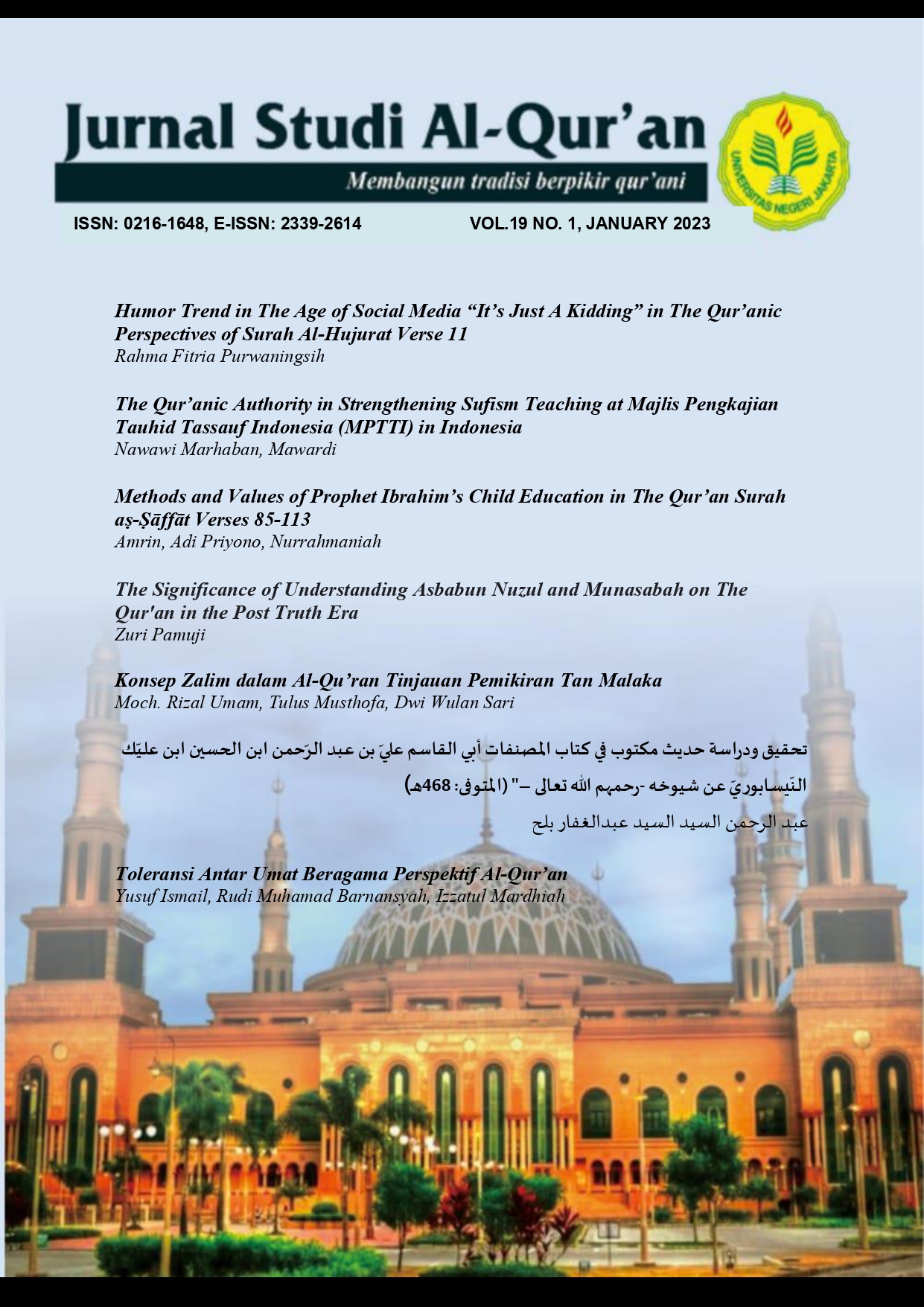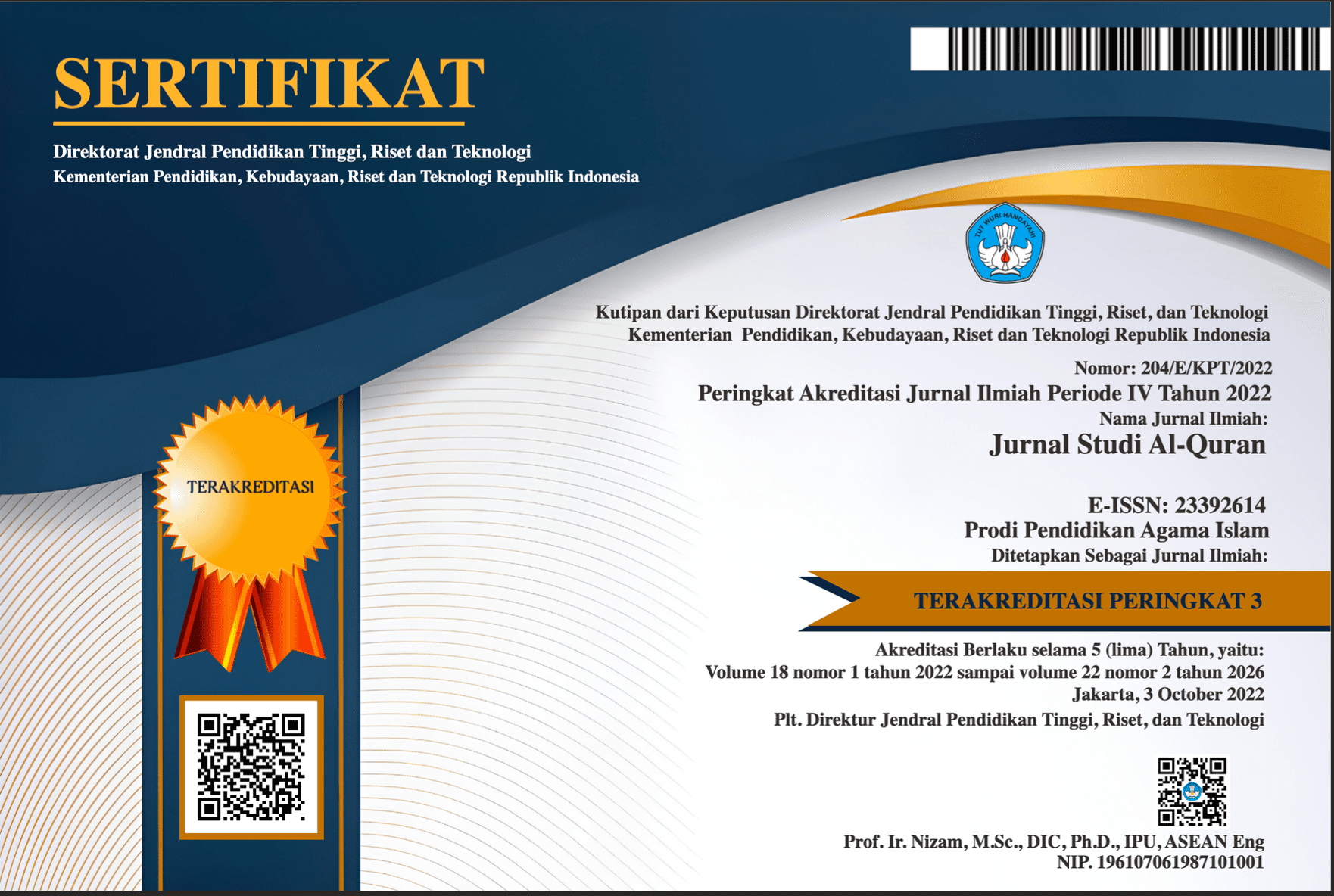Inter-Religious Tolerance from the Perspective of the Qur'an
DOI:
https://doi.org/10.21009/JSQ.019.1.07Keywords:
Tolerance, Religion, Tafsir ThematicAbstract
The Hudaibiyah agreement initiated by the Prophet Muhammad SAW initially marked tolerance in Islam. Tolerance in Islam is authentic, meaning it is not foreign and has even emerged since Islam existed. Because of its unique nature, tolerance in Islam is only a matter of implementation and commitment to practice it consistently. Nor is it for exchanging beliefs among the different religious groups. Tolerance here is in the sense of muammalah (social interaction). So there are common boundaries that may and may not be violated. This is the essence of tolerance, where each party must control themselves and provide space for mutual respect's uniqueness without feeling threatened by their beliefs or rights. Sharia has guaranteed that there is no compulsion in religion. Because forcing other people to follow our religion is a historical attitude which has no basis or example in the early history of Islam. It is precise with this fantastic tolerant attitude that the history of Islamic civilization has produced such brilliance that it is recorded in gold ink by the history of world civilization to this day and God willing in the future.
References
Effendi, M. R. (2020). Mitigasi Intoleransi dan Radikalisme Beragama di Pondok Pesantren Melalui Pendekatan Pembelajaran Inklusif. Paedagogie: Jurnal Pendidikan Dan Studi ISlam, 1(01), 54-77.
Effendi, M. R. (2021). TEOLOGI ISLAM Potret Sejarah dan Perkembangan Pemikiran Mazhab Kalam. Literasi Nusantara.
Effendi, M. R., Khoerunnisa, I., & Syaprudin, D. (2021, November). Improving the Ability to Read the Qur'an Through Qiro'ati Method. In Proceeding International Conference on Islam and Civilization (ICONIC) (Vol. 1, No. 1, pp. 319-330).
Effendi, M. R., Ismail, Y., Darma, S., Wulandari, D., & Adzra, Z. (2022, July). The Theology Of Entrepreneurship: The Identity Of The Millenial Muslim Student Entrepreneurship Movement In Universities. In Proceeding International Conference on Islam and Education (ICONIE) (Vol. 2, No. 1).
Hadiyanto, A., Hanafi, Y., Barnannsyah, R. M., Samitri, C., & Ulfah, S. M. (2022). Moderation Patterns of Pesantren in Indonesia: A Study on the Perceptions and Responses of Kyai, Teachers and Santri. Hayula: Indonesian Journal of Multidisciplinary Islamic Studies, 6(1), 81-100.Majlis Tarjih dan Pengembangan Pemikiran Islam PP Muhammadiyah. Penerbit Pustaka SM. 2000
Narulita, S., & Hadiyanto, A. (2021). Konsep Karakter Pluralis dalam Al-Qur’an dan Internalisasinya dalam Dunia Pendidikan. Jurnal Studi Al-Qur'an, 17(2), 233-263.
Shibab, Quraish. (1999). Tafsir Tematik Al-Qur'an: tentang hubungan Sosial antar Umat beragama. Wawasan M Quraisy. Shihab . wawasan al-Qur'an9Tafsir maudhui atas berbagai persoalannumat, Cety IX. Bandung Mizan
Terjemah Tafsir Ibnu Katsir, ter. Bahrun Abu Bakar LC., juz 1, cet. II, Bandung : Sinar Baru
https://minanews.net/pluralitas-dalam-al-quran-oleh-imaam-yakhsyallah-mansur
Downloads
Published
How to Cite
Issue
Section
License
Authors who publish with this Journal agree to the following terms:
- Author retain copyright and grant the journal right of first publication with the work simultaneously licensed under a creative commons attribution licensethat allow others to share the work within an acknowledgement of the work’s authorship and initial publication of this journal.
- Authors are able to enter into separate, additional contractual arrangementfor the non-exclusive distribution of the journal’s published version of the work (e.g. acknowledgement of its initial publication in this journal).
- Authors are permitted and encouraged to post their work online(e.g. in institutional repositories or on their websites) prior to and during the submission process, as it can lead to productive exchanges, as well as earlier and greater citation of published works.
Users/public use of this website will be licensed to CC BY










